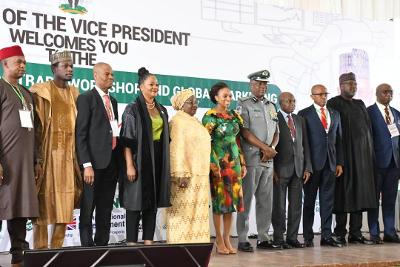Nigeria has officially been designated as Africa’s Digital Trade Champion, a role that could help create over 10 million new jobs across the continent by the end of 2025.
To this effect, Vice President Kashim Shettima has reaffirmed the country’s commitment to leading Africa’s digital trade agenda under the African Continental Free Trade Area (AfCFTA).

The Vice President, who was represented by the Minister of Industry, Trade, and Investment, Dr Jumoke Oduwole, stated this on Wednesday during the AfCFTA Digital Trade Workshop and Global Market at the State House Conference Centre in Abuja.
The workshop, which brought together officials from the federal and state governments, including Commissioners of Trades and Industry and private sector experts, has the theme: “Unlocking State Exports Potential.”

Digital Trade Hub
According to VP Shettima, Nigeria’s progress in digital commerce, services, and innovation, has positioned the country as the continent’s digital trade hub.
“Our innovations in mobile payments have transformed cross-border payments, financial inclusion, and digital transactions across the continent,” he stated.
Nigeria’s appointment as Africa’s Digital Trade Champion followed President Bola Tinubu’s December 2024 pledge in Cape Town to champion the digital trade agenda for all Africans.
This leadership role was formally recognized at the 38th African Union Heads of State Summit, where President Tinubu received a commendation from former Niger President Mahamadou Issoufou, the AfCFTA Champion.
Speaking at the two-day workshop, the Vice President also announced that Nigeria’s Ambassador to the World Trade Organization, Dr. Adamu Abdulhamid, has been appointed chairperson of the Committee of Trade and Services Special Session, effective this month.
“The AfCFTA Digital Trade Protocol aims to increase intra-African trade from 18% in 2022 to 50% by 2030. With over 109 million internet users and a thriving mobile economy, Nigeria has the foundation to lead Africa’s digital commerce evolution,” Shettima noted.
The Internet economy is projected to contribute 5.2% of Africa’s GDP this year, with the continent’s digital economy expected to reach $180 billion, up from $115 billion in 2020.
Also speaking, the Minister of Youth Development, Mr Ayodele Olawande, described the workshop as a welcomed development, recalling that last year, President Tinubu had approved the Nigerian Youth Investment Fund to empower Nigeria’s young entrepreneurs and SMEs.
Noting that the significant approval of the Youth Investment Fund will be dedicated to supporting young Nigerians, the Minister noted that the Tinubu administration “is producing capital businesses for the young entrepreneurs engaging in agriculture, manufacturing, textile, creative industry, digital services and other export items so that they can meet the international trade standard.
“I also believe that this platform and strategic partnerships will help the youths to own their businesses to connect with the international digital trade and make Nigeria productive and globally competitive,” he added.
Kaduna State Governor, Uba Sani, said a nation that fails to embrace digital trade will certainly be left behind, just as he applauded the Tinubu administration for making significant strides in the ICT sector.
The Governor, who was represented by his deputy, Dr Hadiza Balarabe, said, “Digital trade platforms have eliminated traditional trade barriers, allowing businesses, both big and small, to participate in regional and global markets like never before. Today, we are reminded of the immense potential that lies within the African Continental Free Trade Area in a world increasingly defined by interconnectivity.”
The Minister of Art, Culture, Tourism and Creative Economy, Hannatu Musawa, commended the Vice President for championing digital trade innovations, saying while Nigeria has the tools to unlock its potential in the sector, AfCFTA is an opportunity to leverage the nation’s strength, especially in the creative industry.
Also speaking, Comptroller General of the Nigeria Customs Service, Adewale Adeniyi, outlined the agency’s commitment to digital trade facilitation at the workshop.
He emphasized the central role of export promotion in Nigeria’s current economic strategy.
“Customs has established a dedicated export command in Lagos, and they actively participated in AfCFTA’s guided trade initiatives. We have deployed advanced digital solutions, including a new platform christened B’Odogwu, intended to improve transparency and efficiency by connecting all stakeholders on a unified system,” he said.
Director General of the National Identity Management Commission (NIMC), Engr. Abisoye Coker-Odusote, presented data on how digital identity systems will transform Nigeria’s trade landscape.
“This shift to digital trade presents an enormous opportunity for Nigeria to diversify its economy and leverage non-oil assets,” Coker-Odusote stated, projecting substantial growth in business registrations through digital channels in the coming years.
In his welcome remarks, Special Assistant to the President on ICT Policy, Dr Salihu Nakande, said, “AU’s endorsement of Nigeria as the AfCFTA Digital Trade Champion is a testament to our country’s strategic role in shaping the future of digital commerce across the continent.
“With this endorsement, Nigeria is not just a participant—we are leading the charge in designing the frameworks, policies, and innovations that will drive Africa’s digital economy forward.”
Also, Special Assistant to the President on Export Promotion, Aliyu Bunu Sheriff, said, “In 2024, Nigeria’s non-oil exports exceeded $5.4 billion, yet this is only a fraction of our true potential. To sustain economic growth, stabilise the naira, and create jobs, we must transition from a predominantly consumption-driven economy to one centred on production and value addition.
“The European Union imports over $120 billion worth of fruits and vegetables annually. If Plateau State, which is rich in fruits and vegetables, captures just 2-5% of this, that translates to $2.4 billion to $6 billion in exports.”
Also, Country Director for the British High Commission’s Department for Business and Trade in Nigeria, Mark Smithson, said, “AfCFTA is the African Union’s most ambitious regional economic channel. The AfCFTA holds the potential to be a game changer for Nigeria’s inclusive economic change, driving industrial growth, generating jobs and delivering inclusive prosperity across the continent as well as in Nigeria.”


Comments are closed.